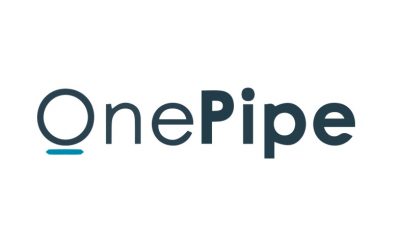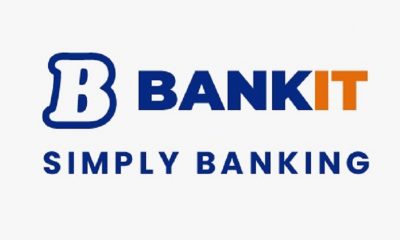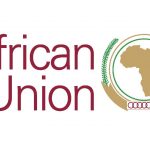Banking
Yvonne Elaigwu Foresees Convergence in Digital, Traditional Banking Systems

Yvonne Faith Elaigwu is an experienced manager with a demonstrated history of working in the financial services industry and the Corporate Social Responsibility (CSR) space some of which include the UBA Foundation and Oando Foundation.
She is skilled in people management, negotiation, business planning, events planning, analytical skills, and sales. She has a Master’s degree focused in Environmental Management from the University of Lagos.
Yvonne Elaigwu is currently the Head of Operations at OnePipe, a foremost fintech API company and a Trustee at Open Banking Nigeria. In this interview, she discussed the future of the payment system in Nigeria, revealing the trends that will drive growth in the Nigerian financial tech space.
Kindly give us a brief description of who you are and your professional background?
I studied Human Anatomy at the University of Maiduguri with the goal of being a genetic engineer. Then I got a job! My first job was an Operations role and I quickly found that I enjoyed being a part of the team in the backend that provided the support and structure that ensures that all goes well. Every role I have occupied since then has been Operational in nature. I have been doing this now for over 12 years across the NGO space, banking, CSR and now in the technology space. Somewhere in between these jobs, I got a master of Environmental Management degree from the University of Lagos.
How would you describe the position of the current payment systems that are available in the Nigerian business space today?
I’d say our payment systems are growing and evolving. Transaction volume and value are growing exponentially, NIP transactions alone in 2020 were over N235 trillion which is nearly 100 times more than the e-payments transaction less than about 8 years ago. The COVID-19 pandemic literally forced the world to prioritize contactless interactions and the payment system was not excluded. This is probably one of the drivers of the rise and adoption of payment via transfer; Pay With Transfer.
About 10 years ago, the value of NIP transactions was 4,449,654 as reported by the Central Bank of Nigeria (CBN) less than 2% of the 378,100,749 pulled in by POS terminals and ATM machines. I remember a time when every saloon and corner store was hustling to get a POS machine from their banks. It was the new in-thing and everyone needed a machine to receive payments. The store owner and customer both relied on the POS slip to confirm that a transaction was successful. It’s interesting that these store owners and merchants had bank accounts but did not think to accept payments directly into them. Today, the concept of Pay With Transfer is so accepted that the cab driver, who before now would only accept cash, (who probably never went through the POS stage) would, without much ado share an account number to receive payment for his services. Data supports this shift and growth, the CBN report on e-payments showed that in 2020, “pay with transfer” NIP volume was about 200% more than the volume of payments made on both POS terminals and ATM machines and significantly more in transaction value.
Businesses are more now comfortable with receiving payments digitally, most businesses today are profiled to receive payments digitally and this is evidenced in the fact that the transaction value and volume of all e-payment platforms are consistently growing.
What are your views on digital currencies? Do you think that they will eventually be implemented in our economy?
I am no subject matter expert here, but it looks to me that they are here to stay. Like all new “products”, they would come with their teething problems, bugs and losses. Costly mistakes would be made and lessons would be learnt. The Luna scenario of the last couple of days taught me and hopefully the ecosystem that “it’s not really stable unless it is pegged against actual money sitting in a bank account”. It’s like purifying gold, at the end of the day, impurities would be removed and a gem would emerge. While it may take us some time as a country or an economy to get onboard with a new technology (e.g. like it did with mobile networks and cell phones), we eventually catch on and make up for the lost time. I personally believe that once digital currencies are established, and become relatively more mainstream, they would be implemented and even encouraged in our country. This would probably take time, but it is very likely to happen.
What are the trends that will shape the financial space in Nigeria in a few years to come?
I think that the concept of Embedded Finance will take root and grow/shape the Nigerian financial space in a short time from now. This would be evidenced in close partnerships between traditional banks, lenders and BaaS companies to enable merchants and “regular” entities like the distributors, cooperative societies, farmers’ associations etc to provide financial services to the last mile customer. This would improve financial literacy and bank more customers. The thinking is that the farmer who has been “acquired” by his association of farmers, would know to ask that entity for a loan to grow his farm. This entity knows him and his operations intimately enough to offer him this facility. The same can happen with the distributor who acquires his retailers and offers them banking services. What would now begin to happen is that last mile customers are becoming more banked, where they are now incentivised to save their funds within the banking system in order to create transaction trails that make them eligible for credit facilities to grow their businesses and take care of pressing needs.
I also think that we will also begin to see simplified and more secure payment methods as people continue to embrace “pay with transfer”. Data already shows that people are gravitating toward this mode of payment and the failure rate of card transactions is not making it harder. In the future, the relevance of card payments would be minimized, thereby reducing the associated fraud incidences accompanied by card payments.
In what way would you say that technology is impacting the financial sector in Nigeria?
With a mobile network coverage of 99% and data from the 2019 Jumia report on Nigeria that shows that 87% of Nigerians are mobile network subscribers, it means that technology, when properly directed, can be the tool to reach the unbanked and educate the underbaked.
The rise and proliferation of technology startups in the finance space is the first glaring way that we see technology impacting the finance sector in Nigeria. The prevalence of technology has made it possible for enterprising Nigerians to build solutions that can change people’s lives. These ventures have over the years attracted billions of dollars worth of capital into the country, provided employment to thousands of people and in 2021, technology startups contributed about 10% of Nigeria’s GDP. These technology-driven companies are building and shipping solutions targeted at the unbanked and underbanked in the country and making them available on progressive web apps, downloadable apps, USSD and POS machines. The chances that an individual in the remote village of Obagaji, Agatu where I come from (where there is no physical bank) with a mobile phone (any kind of mobile phone) is able to access a financial service today is very high and attributed to technology, driven by technology companies.
Technology has made it possible for the regular person to have access to resources on financial instruments, concepts and data with which they can make informed decisions to improve their life conditions-everything is a google search away.
Digital banking versus the traditional banking system, do you think there will be a convergence?
Eventually, yes. While digital banking is the “now” and the future, traditional banks are here to stay and will need to come to a place (probably are in that place already) where they decide between fighting digital banks, competing against them or partnering with them. We are beginning to see partnerships in the US, Europe and even here in Nigeria between traditional banks and digital banks to birth the concept of Embedded Finance, which is a relatively new concept. We expect to see more of these in the future.
As head of operations at OnePipe, what excites you about working in a startup business in Nigeria?
The challenge of building new products and systems; the joy and feeling of satisfaction from being a part of birthing something that has the propensity to change lives and influence people and economies.
Give us one practical example of a business that gained from the successful solution that OnePipe has delivered to them?
Omnibizz, a unified distribution platform in the FMCG space digitized their operations in the wake of the COVID-19 pandemic. Omnibizz worked with OnePipe to embed financial services such that their customers can now pay directly into the account of their retailer. Their retailers can also place orders, track their sales, pay for their orders, apply for credit and get approved without leaving the digital platform provided to them by Omibizz. This has reduced and will continue to reduce the dependence on cash transactions with the attending risks. It offers seamless payments, an opportunity to bank the underbanked retailer and possible credit to grow their market
What are your winning strategies for managing people who work with you, both internally and externally?
I default to treating people how I want to be treated, I also try to understand people and learn how to communicate with them.
In terms of getting the operations of a business right, what is that one piece of advice that you would offer to women who choose to launch startups in Nigeria?
In terms of operations, I would advise that you decide very quickly on the type of company you want to build and find one person whose job it would be to help champion that from the scratch. When building a startup, operational practices may not be top on the list of most important things for the company because you’ll be building products, finding product-market fit and generally just figuring out. With at least one resource dedicated to ensuring that you incorporate standard best practices into your operations and course-correct as you go, you are less likely to run into heavy-duty operational headaches in the future.
Banking
Onafriq, PAPSS to Launch Wallet-Based Outbound Payments from Nigeria to Ghana

By Modupe Gbadeyanka
A platform to enable cross-border intra-Africa payments for individuals, merchants, and traders in Nigeria and Ghana is being designed by Onafriq Nigeria Payments Limited in partnership with the Pan-African Payment and Settlement System (PAPSS).
The platform, currently in its pilot stage, is the first wallet-based outbound payments scheme, which is fully in Naira and instant, without relying on hard currency conversion.
The parties are working together with banks and mobile money operators in the West Africa nations.
The Central Bank of Nigeria (CBN) has already approved this initiative, which will benefit small and medium enterprises (SMEs), the real engine of intra-African trade, as they will now have access to a faster, cheaper way to reach customers and suppliers across the border.
By reducing barriers to cross-border trade, the new service will allow these businesses to grow their addressable markets and activity. From December 1, this service will be fully operational for a 6-month period.
Through the partnership with PAPSS, Onafriq, which is a CBN licensed payment service provider, is supporting the operationalization of the Africa Continental Free Trade Area (AfCFTA) mandate. The mandate itself is driving tariff-free trade for the 54 member states of AfCFTA. Within the partnership itself, Onafriq provides the mobile money rails, with an ecosystem consisting of over 1 billion mobile wallets.
Meanwhile, PAPSS brings a network of over 160 commercial banks, representing an ecosystem of more than 400 million bank accounts across its 19 African countries of operation. The two partners are essentially seamlessly connecting two worlds: mobile money and banking. As a consequence, intra-African trade transactions will take place more easily and opportunities will be created.
Currently, Africa is made up of bank and mobile-led markets, with siloes often inhibiting transactions between these economies. However, this partnership will remove these boundaries. With over one billion mobile wallets and 500 million bank wallets across Africa, this partnership will allow for cross-border collaboration at scale.
This partnership builds on Onafriq and PAPSS’ existing partnership for payments into Ghana, announced earlier this year.
“Our work with PAPSS shows what collaboration at scale can unlock—seamless, secure connections between banking systems and mobile money ecosystems. This is how we open bi-directional trade corridors, reduce costs for businesses, and give African enterprises the rails they need to trade with confidence in their own currencies. The vision is continental, but it starts with practical steps like this one,” the Managing Director for Anglophone West Africa, Mxolisi Msutwana, said.
The Chief Information Officer for PAPSS, Ositadimma Ugwu, added, “Too often, African businesses and individuals see borders as roadblocks instead of opportunities. With this step, we’re challenging that mindset, giving Nigerians the ability to send value next door with the same ease as sending a text message. Our vision is simple: make Africa’s borders invisible to payments. This pilot makes that a reality, moving us closer to a continent where payments don’t pause at the border.”
Banking
Access Bank Appoints Ifeyinwa Osime as Board Chair
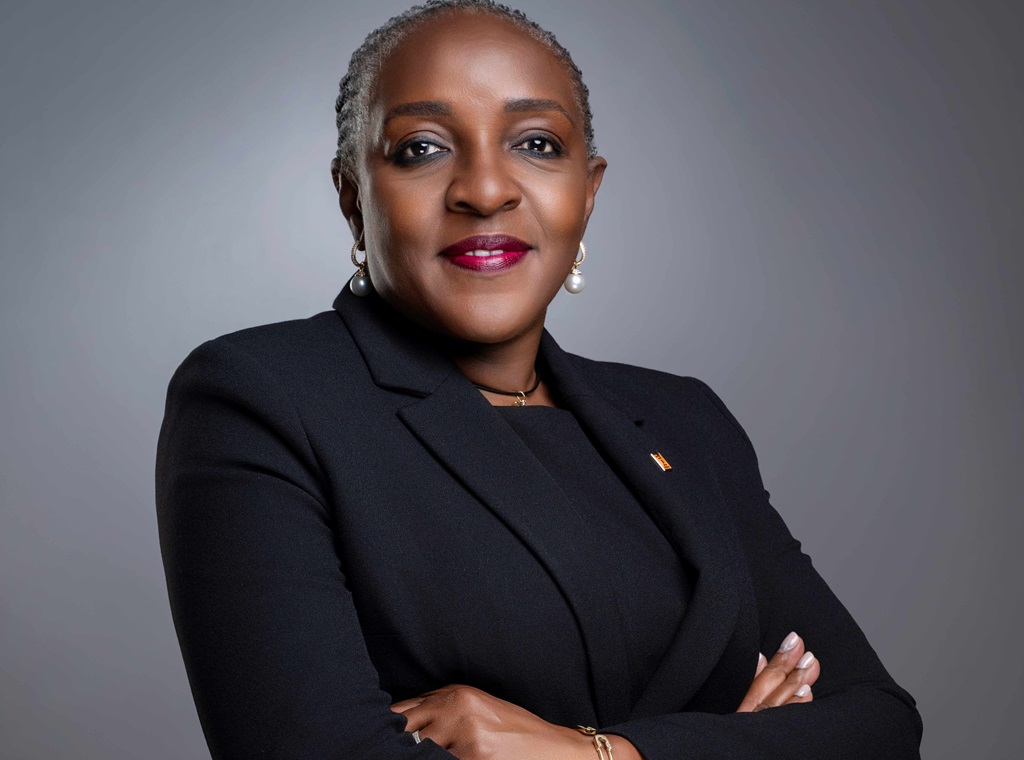
By Adedapo Adesanya
Mrs Ifeyinwa Osime has been appointed as the chairman of the board of Access Bank Plc, following the retirement of Mr Paul Usoro on January 29, according to a statement to the Nigerian Exchange (NGX) Limited.
Mrs Osime, an accomplished legal practitioner, joined Access Bank’s board in November 2019 as an independent non-executive director and had chaired the Board Human Resources and Sustainability Committee and the Governance, Nomination, and Remuneration Committee.
This role made her contribute significantly to bank’s corporate governance, leadership development, and sustainability initiatives.
In addition to her role at Access Bank, Mrs Osime is a Director at Ebudo Trust Limited and a Partner at McPherson Legal Practitioners, where she advises on corporate and commercial matters and contributes to strategic leadership.
She is also a member of the Nigerian Bar Association, Women Corporate Directors, Nigeria Chapter, and Chartered Institute of Directors Nigeria, where she serves on the Executive Committee of the Women Sectorial Group.
Beyond her professional responsibilities, Mrs Osime is committed to mentoring youths and is actively involved in the Autism and Developmental Delays Support Community, reflecting her dedication to inclusion and social impact.
Speaking on her appointment, the chairman of Access Holdings, Mr Aigboje Aig-lmoukhuede, said: “Mrs Osime is a principled and experienced leader with a deep understanding of the Bank’s strategy and values.
“She has demonstrated strong commitment to the Bank’s vision and mission, and I am confident that, under her leadership, the Bank will continue to advance its strategic objectives of delivering sustainable value to shareholders and other stakeholders in the pursuit of its vision to become the world’s most respected African Bank.”
He also congratulated Mr Usoro on the completion of his tenure and for his exemplary leadership, dedication and significant contribution to the Group, saying he remains a valued member of the Access Bank family.
Banking
Africa Energy Bank to Start Operations June as Nigeria Hands Over Headquarters
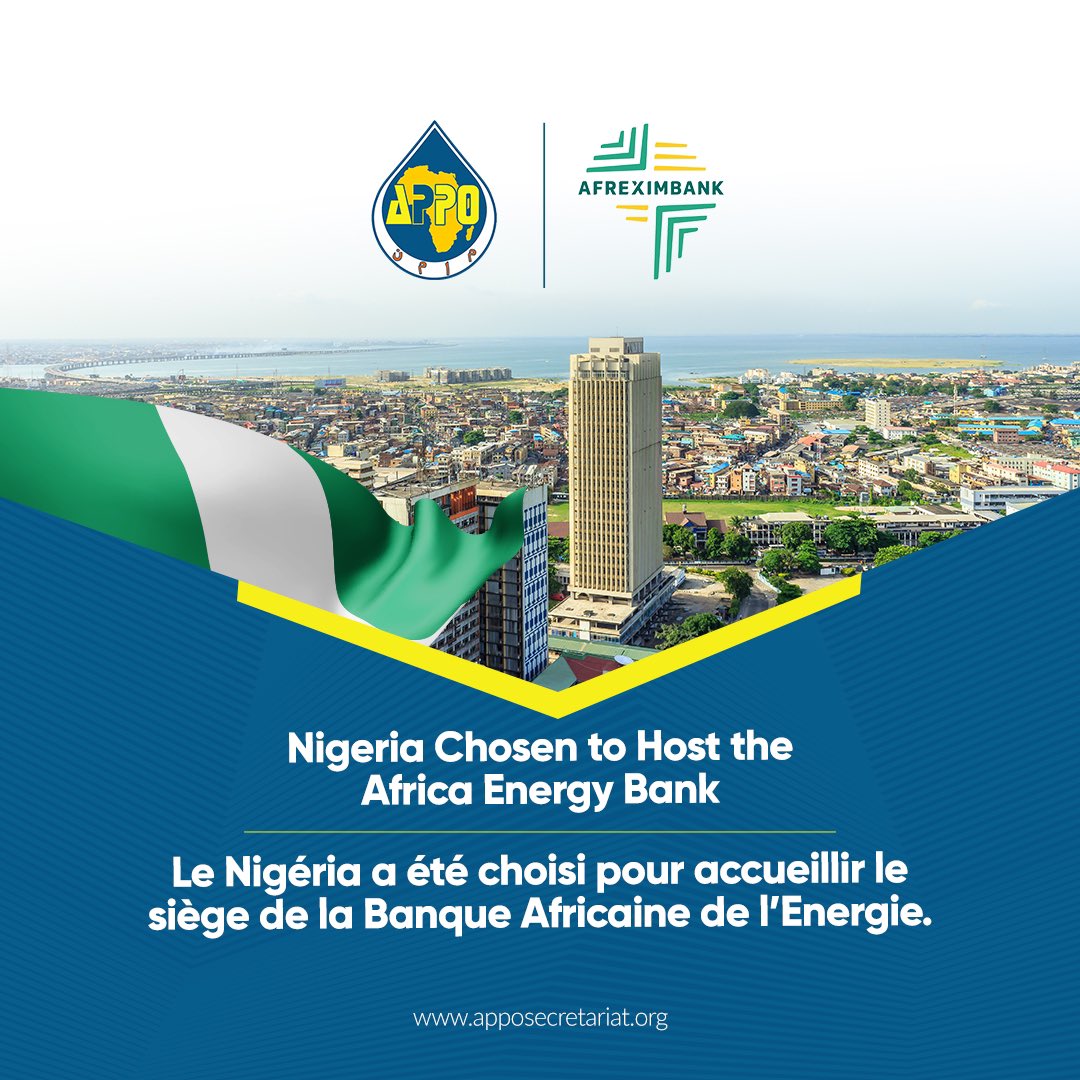
By Adedapo Adesanya
The African Energy Bank (AEB), a pan-African financial institution established to mobilise capital for the continent’s energy development and strengthen regional energy value chains, will begin operations in June 2026.
This came as Nigeria officially handed over the headquarters of bank at a ceremony held on the sidelines of the ongoing Nigeria International Energy Summit (NIES).
The president of the African Petroleum Producers’ Organisation (APPO) and Côte d’Ivoire’s Minister of Mines, Petroleum and Energy, Mr Mamadou Colibaly, praised Nigeria for its leadership in bringing the initiative to fruition, as he disclosed the bank was expected to commence operations in four months’ time.
“We are committed to launching this bank no later than June. I sincerely thank our partners for providing the headquarters and office that make this take-off possible. The African Energy Bank represents Africa’s commitment to finance, develop, and secure its own energy future by Africans, for Africans,” he said.
The African Energy Bank is a joint initiative of APPO member states and the African Export-Import Bank (Afreximbank), established to mobilise domestic and regional capital for Africa’s energy infrastructure, reduce dependence on external financing, and align energy investments with the continent’s long-term development and industrialisation agenda.
While performing the handover, Nigeria’s Minister of State for Petroleum Resources (Oil), Mr Heineken Lokpobiri, said the country had fulfilled all its responsibilities as host nation.
“Nigeria has met every obligation as host. The headquarters is ready, strategically located, and fully equipped, and we are prepared for immediate take-off.”
The ceremony highlighted a growing consensus among African leaders on the need for the continent to take greater ownership of its vast natural resources.
Through tailored financial instruments, the bank is expected to support projects across the energy value chain, including exploration, refining, renewable energy integration, and local content development, with a focus on job creation and economic value addition.
The African Energy Bank has been touted as not just another financial institution, but a strategic pillar in Africa’s quest for economic independence and long-term energy security
The African Energy Bank is a pan-African financial institution jointly promoted by APPO member states and Afreximbank to provide tailored financing solutions for energy projects across the continent, strengthen regional energy markets, and support sustainable development through improved access to capital.
-

 Feature/OPED6 years ago
Feature/OPED6 years agoDavos was Different this year
-
Travel/Tourism9 years ago
Lagos Seals Western Lodge Hotel In Ikorodu
-

 Showbiz3 years ago
Showbiz3 years agoEstranged Lover Releases Videos of Empress Njamah Bathing
-

 Banking8 years ago
Banking8 years agoSort Codes of GTBank Branches in Nigeria
-

 Economy3 years ago
Economy3 years agoSubsidy Removal: CNG at N130 Per Litre Cheaper Than Petrol—IPMAN
-

 Banking3 years ago
Banking3 years agoSort Codes of UBA Branches in Nigeria
-

 Banking3 years ago
Banking3 years agoFirst Bank Announces Planned Downtime
-

 Sports3 years ago
Sports3 years agoHighest Paid Nigerian Footballer – How Much Do Nigerian Footballers Earn


